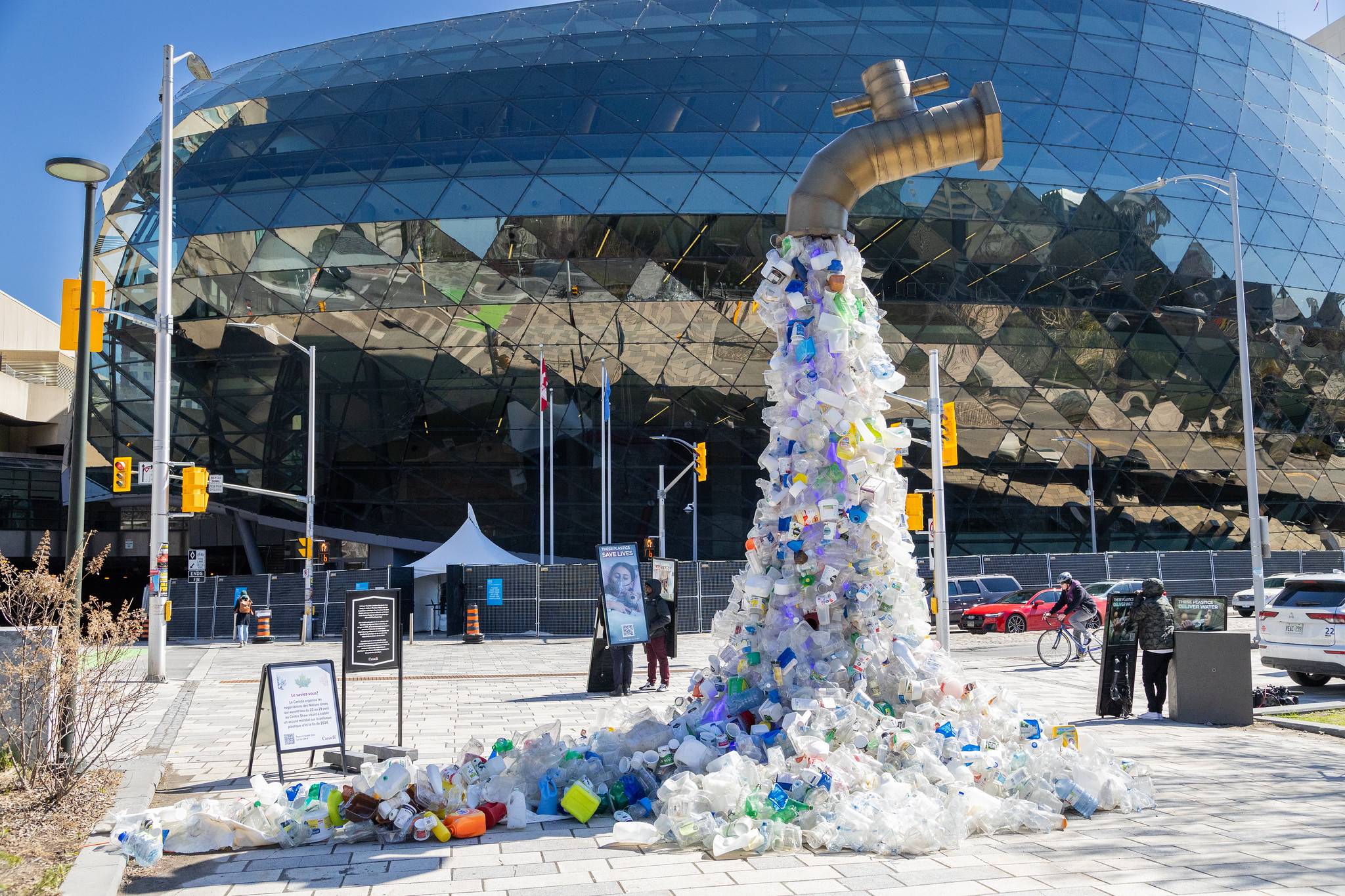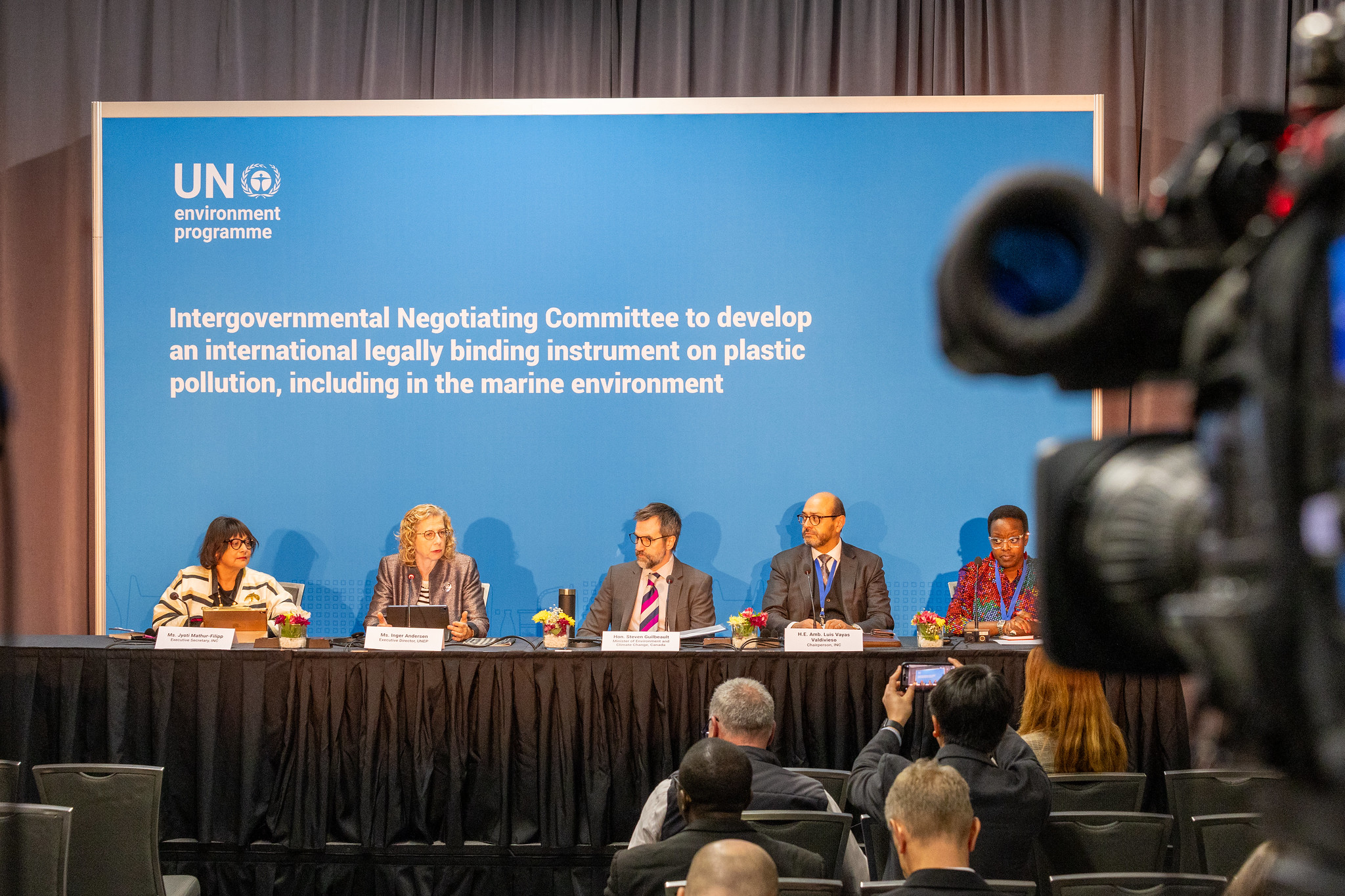
Between April 23 and 29, more than 2,500 delegates gathered in Ottawa, Canada, to continue negotiations on the Global Plastics Treaty. The Intergovernmental Negotiation Committee (INC), tasked with developing an international legally binding instrument on plastic pollution, including in the marine environment, began its work in 2022. The pressure to make substantial progress was very high, as the negotiations are scheduled to conclude at the next session of the INC in Busan, South Korea, in November 2024. It was also hoped that negotiators would finally mandate intersessional work, something they had failed to agree on in previous sessions.
When the chair of the INC, Ambassador Luis Vayas Valdivieso from Ecuador, closed the fourth session in the early hours of Tuesday, April 30, 2024, delegates had made some progress. They had finished streamlining and validating the Revised draft text of the international legally binding instrument on plastic pollution, including in the marine environment, which came out of INC-3 in Nairobi, Kenya. They also completed the first round of line-by-line textual negotiations on some of the individual provisions. Equally important, they finally managed to agree on intersessional work to be conducted in two expert groups.
Despite this progress, many observers expressed disappointment about the results of INC-4. They lamented insufficient progress on important core provisions and a weak mandate for intersessional work.
Focus of Negotiations
During the weeklong negotiations, delegates had a vast array of issues to discuss. The negotiations were organized into two contact groups, which were divided into five sub-groups. Starting from the revised treaty draft text, each subgroup considered different parts of this text and the specific provisions, as shown in the following table.
Distribution of subjects of negotiations between the five subgroups
|
Subgroup 1.1 |
|
|
Subgroup 1.2 |
|
|
Subgroup 1.3 |
|
|
Subgroup 2.1 |
|
|
Subgroup 2.2 |
|
More generally, subgroup 1.1 mainly negotiated the basic introductory elements of the future Global Plastics Treaty, subgroups 1.2 and 1.3 the core obligations to reduce plastic pollution, including various upstream and downstream measures, subgroup 2.1 the mobilization and use of financial and other resources, and subgroup 2.2 provisions related to implementation and institutional setup. In each subgroup, the expected outcomes of the negotiations were twofold. First, delegates were expected to clean up and streamline the existing multiple (and often opposing) options from the revised draft text, e.g., through textual mergers or structural realignments. Once this "technical streamlining" was finished and validated by all member states, the subgroups were expected to start textual negotiations and consider the details and wordings in all provisions line-by-line. The main goal during these two rounds of deliberations was the identification of overlaps and differences, and then the further development of areas of convergence and the introduction of proposals to reconcile divergent positions.
Main Outcomes
Overall, the negotiations in the subgroups did progress. All subgroups finished the validation of technical streamlining and cleanup of the provisions they had to negotiate. This means that member states agreed on simplified and leaner wording and options of provisions as a basis for further negotiations, though these remain heavily bracketed. Yet, the first round of line-by-line textual negotiations only covered less than half of all negotiation subjects (15 out of 37 items), as shown in the following table. On two items, the first round of textual negotiations was started but not completed (product design and performance as well as implementation and compliance).
State of textual negotiations in the five subgroups after INC-4
|
|
First round of textual negotiations completed |
|
Subgroup 1.1 |
|
|
Subgroup 1.2 |
|
|
Subgroup 1.3 |
|
|
Subgroup 2.1 |
|
|
Subgroup 2.2 |
|
After difficult negotiations that were on the brink of failure, delegates also agreed on intersessional work. The two established ad hoc open-ended expert groups are mandated to:
- “Develop an analysis of potential sources and means that could be mobilized for implementation of the objectives of the instrument including options for the establishment of a financial mechanism, alignment of financial flows, and catalyzing finance; and;
- Analyze criteria and non-criteria-based approaches, with regard to plastic products and chemicals of concern in plastic products and product design, focusing on recyclability and reusability of plastic products considering their uses and applications.“ (Earth Negotiations Bulletin, Summary report, 23–29 April 2024)
However, neither group is mandated to conduct on-text deliberations, which will pose a challenge. Previous experiences in other processes have shown that integrating proposals from intersessional work into the sessions can pose a time-consuming challenge.
Observations
While there has been progress in the negotiations and a mandate for intersessional work, the cleavages have become more manifest, and negotiations more confrontational between high-ambition countries (those who want an ambitious treaty with legally-binding and upstream provisions) and low-ambition countries (those who believe recycling and waste management will sufficiently reduce plastic pollution). This became apparent when negotiators insisted on the inclusion of the so-called "zero options" (i.e., the deletion or rejection of any provision on certain issues) for a number of core provisions. After INC-4, 14 out of 19 provisions on core obligations feature a "zero option". It was also apparent during the discussions about the intersessional work when the proposal of Peru and Rwanda to work on the reduction of primary plastic polymers was ousted by the like-minded group of oil and gas producing countries. The group even rejected a weaker alternative proposal by Samoa on behalf of the Alliance of Small Island States (AOSIS) to request the INC Secretariat to merely compile studies on this issue. Moreover, the oil and gas producing countries managed to insert language related to recycling and reusability in the mandate for one of the expert groups, thereby attempting to narrow its focus. Overall, this almost intractable conflict over the scope of the instrument has made negotiations and reaching an agreement increasingly difficult. Nevertheless, a growing majority of countries is seemingly in favor of upstream-focused obligations.
Another major cleavage that characterizes the treaty negotiations since their very beginning has again played out in Ottawa. This cleavage pertains to the question of whether obligations should be uniform, legally binding and global, governed by the treaty provisions, or voluntary, based on decisions by and adapted to national circumstances and capabilities in individual member states. This question remains unsolved with no clear majorities for any of the two options. To date, there are no approaches in sight to bridge or resolve these differences, though this is common during intergovernmental environmental negotiations at such points in the negotiations. Even on the issue of plastic waste management (a presumably low-hanging fruit, since all states agree that environmentally sound waste management will play a pivotal role in reducing plastic pollution), some countries insist that any provisions under the instrument shall be voluntary in nature and to be defined at the national level.
Despite these cleavages, negotiations in Ottawa revealed some areas of increasing convergence. In particular, when it comes to provisions on minimum product design requirements, the phase-out of high-risk plastic products and chemicals, Extended Producer Responsibility (EPR) schemes, or the need for considerable financial resources, the majority of negotiators were increasingly able to identify common grounds.
The issue of financing and capacity building will remain at center stage of the agreement. As with all multilateral environmental agreements, the final question for many of the more ambitious developing countries will be "who pays?". Meanwhile, traditional donor countries are trying to broaden the scope of financing measures beyond official development aid (ODA), to also include and attract financial flows from other sources (as reflected in the mandate for the expert group mentioned above).
Overall, lobbying by oil as well as the polymer- and chemical industries has increased at the negotiations over time. CIEL has identified nearly 200 representatives in the provisional list of participants for INC-4. Taking a closer look, representatives of petrochemical and polymer producers have also found their way into the national delegations of China (China Petroleum and Chemical Industry Federation), Iran (National Association of Polymer Industries), Kuwait (Kuwait Petroleum Corporation - Petrochemicals Industries Company), Malaysia (Petronas Chemicals Marketing and Malaysian Petrochemical Association), and Thailand (Plastic Industry Club and Dow Thailand). This lobbying largely supports the positions of the like-minded group of oil, gas, and plastic producing countries that there is no need to adopt upstream measures and, for example, reduce plastic production. For this group, downstream measures that improve waste management would suffice.
The Way Forward for SWITCH Asia Countries
With only 7 days of negotiation remaining in Busan, South Korea, in November 2024, delegations will need to exercise immense discipline to finalize the negotiations successfully. The streamlined draft treaty text contains more than 3,500 brackets that negotiators need to resolve in one way or another before a Global Plastics Treaty can be adopted. In Ottawa, attempts by the EU and others to agree on an additional session of the INC were rejected by the like-minded group. An option to move forward, albeit not a particularly ambitious one, might be the conclusion of a framework agreement in Busan on the basis of which parties will continue negotiating the detailed provisions to combat plastic pollution. Whatever the outcome of Busan, it is certain that the conflict over obligations on upstream solutions and over mandatory or voluntary provisions, as well as global or national obligations, will prevail. Another potential threat to reaching any agreement is the still unresolved conflict over voting rules in the rules of procedure that have not been adopted yet. Here, the question is whether the INC can—as a last resort and if all efforts to reach consensus were exhausted—adopt decisions by a two-thirds majority. As long as this issue is not resolved, the necessity for unanimous consensus will prevail, which offers each state a de facto right to veto any decision, even if it is supported by an overwhelming majority.
Related articles and publications:
Photo credits: United Nations Envrionment Programme, INC-4 on Plastic Pollution Flickr



